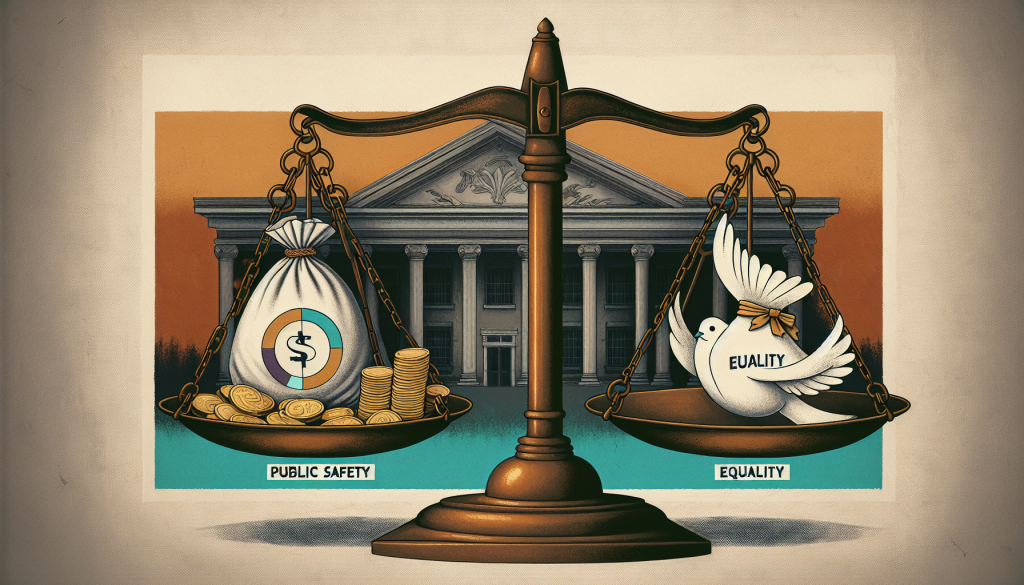
Cash Bail Reform: Balancing Public Safety and Equality
Cash bail has long been a controversial issue in the American criminal justice system. On one hand, it serves as a tool for ensuring public safety by keeping dangerous criminals off the streets. On the other hand, it has been criticized for perpetuating systemic inequalities and contributing to mass incarceration. Recently, there has been a growing movement for cash bail reform, with advocates arguing for a more balanced approach that considers both public safety and equality. In this article, we will dive into the debate surrounding cash bail reform and explore potential solutions that can achieve a fair and effective criminal justice system for all.
Cash Bail Reform: An Overview
At its core, cash bail is a monetary amount set by a judge that a defendant must pay in order to be released from jail pending trial. The idea behind cash bail is to ensure that the accused will show up for their court date, as they risk losing the money they put up if they fail to appear. However, this system has come under fire for perpetuating inequality, as those who cannot afford bail remain incarcerated while their wealthier counterparts are able to buy their freedom.
According to a report by the Prison Policy Initiative, nearly 500,000 people are held in jail on any given day solely because they cannot afford bail. This not only disproportionately affects low-income individuals, but also perpetuates racial disparities in the criminal justice system. Studies have shown that black and Hispanic defendants are assigned higher bail amounts compared to white defendants charged with similar offenses.
The Impact on Public Safety
While critics of cash bail argue that it unfairly targets the poor, supporters maintain that it is a necessary tool for keeping dangerous individuals off the streets. They argue that releasing a defendant on bail poses a risk to public safety, especially in cases where the accused is charged with serious offenses such as violent crimes or drug trafficking.
However, research has shown that there is no correlation between cash bail and public safety. In fact, a study by the Pretrial Justice Institute found that individuals released on cash bail had lower rates of pretrial misconduct compared to those released on their own recognizance. This suggests that the amount of money a defendant has does not determine their likelihood of committing a crime while awaiting trial.
The Push for Reform
Amidst growing concerns about the negative impact of cash bail, there has been a push for reform across the country. In 2018, California passed a law that eliminates cash bail and replaces it with a risk assessment system. This system considers factors such as the defendant’s criminal history and flight risk, and then determines if they should be released or held in jail. Other states, including New Jersey and New Mexico, have also implemented similar reforms.
Proponents of these reforms argue that they provide a more fair and evidence-based approach to pretrial release, rather than basing it on a defendant’s ability to pay. However, critics have raised concerns about the effectiveness of risk assessment tools, highlighting their potential for perpetuating racial biases. Furthermore, there are concerns about the lack of oversight and transparency in these systems, as well as the potential for defendant’s rights to be violated.
A Holistic Approach
While the debate over cash bail reform continues, there are alternative solutions being proposed that aim to balance both public safety and equality. For example, some states have implemented pretrial services that provide support to defendants while they await trial, such as mental health services or drug treatment programs. These programs not only address the underlying issues that may have led to the defendant’s arrest, but also offer alternatives to incarceration.
Furthermore, there is a growing call for more comprehensive criminal justice reform, including addressing the root causes of poverty and inequality that contribute to mass incarceration. By addressing the structural issues in our society, we can create a more fair and just system that benefits all individuals, regardless of their economic status or race.
Final Thoughts
The debate surrounding cash bail reform remains complex and contentious, with valid arguments on both sides. However, it is clear that the current system is not working for everyone, and there is a need for change. By finding a balance between public safety and equality, we can move towards a more equitable criminal justice system that upholds the principles of justice and fairness for all individuals.
Citation: Prison Policy Initiative. (2020). How many people are held in jail because they can’t afford bail?. Retrieved from https://www.prisonpolicy.org/reports/inconfirmity.html
